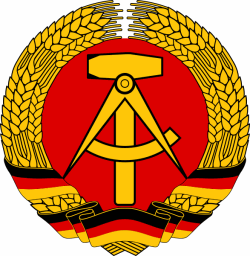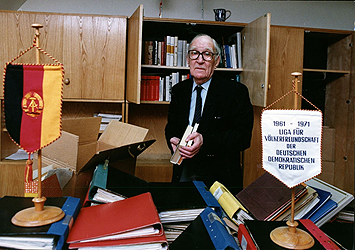

The following is only a very loose electronic translation of the original Swedish which follows afterwards. If someone would be willing to volunteer their services to give us a clean English translation, this would be very much appreciated as it is a very important article. Thank you. (CCMW)
The Swedish unit was the school's architects, according to recently published data in the Stasi archives, experts in the atheistic upbringing and saw Swedish textbooks as an important way of atheistic education through the state religious education.
Together with the Stasi employees, the Swedish school politicians strategize on how Christianity's historical place in the Swedish educational system would be discouraged and marginalized.
In large parts of the world after World War II - in protest against Nazism and Communism, the use of schools for ideological exercise - formulated conventions limited States to relax a grasp of the school, reinforced Sweden instead links to the GDR's school system, indicates new data Stasi archives.
The Swedish setting included the Sweden for a long time did not sign the European Convention and UN declarations that would strengthen the right of parents to choose education.
"The right to choose the education that shall be given to children, to come in to their children".
United Nations Universal Declaration of Human Rights
"No one shall be denied the right to education. In the exercise of the activities the State may assume in terms of upbringing and education, the State shall respect the right of parents to ensure their children an education and teaching in conformity with their religious and philosophical convictions."
European Convention on Human Rights, First Protocol, Article 2.
It has now emerged from the facts Stasi archives shed new light on this negative attitude to both the choice and to Christianity's place in the education system. Birgitta Almgren, Professor at Södertörn University College, has done research in the Stasi archives and have discovered how the Swedish school system for decades was influenced by the GDR.
In his book "Not only the Stasi," she describes the close working relationship Sweden and the GDR was on the school grounds until the Berlin Wall.
School policy and humanist Stellan Arvidsson and his companion Britta Stenholm was they who dominated the Swedish school policy for decades, through school policy studies and social debates.
They sat in the 1946 School Commission, and when former Prime Minister Tage Erlander in the 1980s, writes about the school he was appointed Commissioner in 1946, he wrote that the content "was essentially written by Stellan Arvidsson" (Interview with Arvid Lagercrantz, 1982). In addition to ATP reform described Tage Erlander the accompanying school reform as "our greatest reform in the postwar period."
As the author of the chapter "Christianity and the school" in the book "The Atheist Handbook" in 1964 he went to the assault against Christianity that would have a privileged place in the Swedish educational system.
That his thoughts had popular support, the fact that a policy proposal that would remove the special status of Christianity in religious education in secondary topic that year was halted by a petition which gathered over two million names.
The Stasi archives are a report to the GDR Politburo describing Stellan Arvidsson's belief that the textbooks were important means of atheistic education in the state religious education.
Arvidsson was described as very interested in Marxism-Leninism and was presented as an expert on atheist upbringing.
(It is no wonder that the Humanist The former chairman, Carl-Johan Kleberg - President until 2004 - see Stellan Arvidsson as a hero. The member magazine Humanisten described Arvidsson as a central figure to "remove an outdated, class affect schools and replace it with what has become today's elementary school. "In conversations with the world today reveals Carl-Johan Kleberg him to use pieces from Stellan Arvidsson last book of his own funeral." Stellan Arvidson was a great humanist, but a remarkable man. He became a great reformer of the Swedish school system. I think much of what he said is very good, I will use passages from his book ... to my funeral. ")
Stellan Arvidsson was for many years rector of the Stockholm public school seminar and a Social Democrat member of parliament from 1957 to 1968 years.
Britta Stenholm was a school inspector, skoldirektör and wrote in the school leader. She led textbook reviews, was commissioned by the Ministry of Education, National Board, Nordic Council of Ministers and the National AB school trip. She collaborated with Jens earrings since the 1940s (earrings was director general of the SO).
DDR-winning Stellan Arvidsson and Britta Stenholm with spa visits, decorations, medals and honorary doctorates. Stasi archives reveal how they obtained a privileged position: "A holiday in a seaside resort on the Baltic Sea is really to organize without any problems ... Maybe you could link it to a few days of study in schools - for which we also invite Britta Stenholm - perhaps a combined educational travel and private relaxation ... "
Stellan Arvidsson got peace medal from the GDR in 1983. Until his death in 1997, he held fast to his defense of the GDR.
"Historians have in the future to explain how a socialist school reform could be implemented in a capitalist country .... How is it that the school systems in the socialist GDR and the capitalist Sweden has so many features in common?"
That was Stellan Arvidsson's acceptance speech when he received the Honorary doctorate at the University of East Germany in Rostock in November 1969.
His honorary doctorate was motivated by "a socialist school reform had been implemented in the capitalist Sweden." At the ceremonies, he was presented to the Swedish unit of the school's architect, Birgitta Almgren writes in his book.
Already in the 1950s, Sweden launched an extensive cooperation with the GDR, with teacher workshops and field trips for Swedish school leaders and teachers, as well as exchanges between textbook authors, universities, schools and school authorities.
Stellan Arvidssom collaborated with the East German universities, while Britta Stenholm had contact with the Ministry of Education.
Contact with the GDR began with secret meetings in Stellan Arvidsson's private apartment in Stockholm, where school politicians from both countries met - from the 1950s up to the GDR's collapse 1990th Stellan Arvidsson and Britta Stenholm book "Unity School is emerging" inspired Werner Kienitz, East German education professor who realized that the Swedish school senior politicians had a very high opinion of the GDR's "progressive" school systems.
Soon developed countries, an intensive exchange about educational materials, educational research and liaison between school politician. Stellan Arvidsson hits arranged with the representatives of the GDR Ministry and made sure that the DDR lecturers participated in the Swedish education and training. School policy and teacher trainers got their part, a grand reception in the GDR.
Training Department at Uppsala University organized courses in German in the GDR and in 1983 received the prestigious Jacob-und-Wilhelm-Preis for his work to spread Marxism-Leninism in the "non-socialist countries," said Education Minister Boehme in his speech to the Swedish winners.
In the 1980s there was public agreement on education between the two countries and ministerial visits succeeded each other.<
As Minister of Education Margot Honecker visited Stockholm in March 1985 expressed Over School Board (so) wish to direct contact between the schools in East Germany and Sweden.
Honecker was in favor of talks with the Director General Lennart Orehag, ministers, Lena Hjelm-Wallen and Bengt Göransson. Although Erland Ringborg and Stellan Arvidsson was with. Both Sweden and the GDR would benefit from such cooperation because the countries had much in common, was the idea.
SEARCH expressed in the late 1980s once again called for partner schools and the Swedish higher education Antiquities said in October 1988 a letter to the GDR's Minister Günter Heidorn extending the research collaboration.
Already in 1972 had 600 Swedish teachers taught in the GDR, which corresponds to a German teacher at a Swedish school. The course material in the summer course in Rostock in 1981 taught in the Swedish teachers' Marxist-Leninist literary theory "and" The socialist society in the GDR ".
A letter published by the National Board and Executive Education Department at Uppsala University as recently as 1993 saw no problem with the courses were organized for Swedish teachers in the GDR. Sven-Eric Henricsson, one of the authors, write the occasional voices were critical, but nothing is mentioned about that morning was devoted to the study of Marxist philosophy.
Professor Birgitta Almgren describes in his book how Stellan Arvidsson and Britta Stenholm in a unique way has affected the Swedish school system. Britta Stenholm did investigations, reviewed textbooks and had a large network because she knew many. She sat with the commission in textbooks and teaching materials reported that had a neutral image of the GDR - the neutral intended GDR regime's image.
Erland Ringborg, chairman of the Stockholm Institute of Education for two years ago, who was director general of National Board (so) a speech in 1989 in Uppsala, where he told that he had been in the GDR on several visits.
He participated in a delegation that studied the state educational production in East Germany in 1967 and was in September 1983 on an official visit to the country along with his minister, Lena Hjelm-Wallen. Two years later, he received the GDR's Minister of Education Margot Honecker to Sweden.
Den svenska enhetsskolans arkitekter var, enligt nyligen publicerade uppgifter i Stasi-arkiven, experter på ateistisk fostran och såg svenska läroböcker som viktiga medel för ateistisk skolning via den statliga religionsundervisningen.
Tillsammans med Stasi-medarbetare lade svenska skolpolitiker upp strategier för hur kristendomens historiska plats i svenskt utbildningsväsende skulle motarbetas och marginaliseras.
När stora delar av övriga världen efter andra världskriget - i protest mot nazismens och kommunismens användning av skolväsendet för ideologisk exercis - formulerade konventioner som begränsade staters möjlighet att koppla ett grepp om skolan, stärkte Sverige istället banden till DDR:s skolväsende, visar nya uppgifter i Stasi-arkiven.
Den svenska inställningen innebar bland annat att Sverige under lång tid inte skrev under Europakonventioner och FN-deklarationer som ville stärka föräldrarnas rätt att välja utbildning.
"Rätten att välja undervisning, som skall ges åt barnen, tillkommer i främsta rummet deras föräldrar" (FN:s allmänna förklaring om de mänskliga rättigheterna).
"Ingen må förvägras rätten till undervisning. Vid utövandet av den verksamhet staten kan påta sig i fråga om uppfostran och undervisning skall staten respektera föräldrars rätt att tillförsäkra sina barn en uppfostran och undervisning som står i överensstämmelse med föräldrarnas religiösa och filosofiska övertygelse" (Europakonventionen om mänskliga rättigheter, första tilläggsprotokollet, artikel 2).
 Det har nu framkommit fakta från Stasi-arkiven som kastar nytt ljus över att denna negativa inställning både till valfrihet och till kristendomens plats i utbildningsväsendet. Birgitta Almgren, professor vid Södertörns högskola, har forskat i Stasi-arkiven och har upptäckt hur det svenska skolväsendet under flera decennier influerades av DDR.
Det har nu framkommit fakta från Stasi-arkiven som kastar nytt ljus över att denna negativa inställning både till valfrihet och till kristendomens plats i utbildningsväsendet. Birgitta Almgren, professor vid Södertörns högskola, har forskat i Stasi-arkiven och har upptäckt hur det svenska skolväsendet under flera decennier influerades av DDR.
I sin bok Inte bara Stasi beskriver hon det nära samarbete som Sverige och DDR hade på skolområdet ända fram till Berlinmurens fall.
Skolpolitikern och humanisten Stellan Arvidsson och hans livskamrat Britta Stenholm var de som dominerade svensk skolpolitik i flera decennier, via skolpolitiska utredningar och samhällsdebatter.
De satt i 1946 års skolkommission och när förre statsministern Tage Erlander på 1980-talet skriver om den skolkommission han tillsatte år 1946, skrev han att innehållet "i huvudsak var skrivet av Stellan Arvidsson" (Samtal med Arvid Lagercrantz, 1982). Vid sidan av ATP-reformen beskrev Tage Erlander den åtföljande skolreformen som "vår största reform under efterkrigstiden".
Som författare till kapitlet "Kristendomen och skolan" i boken Ateisternas handbok gick han år 1964 till storms mot att kristendomen skulle ha en privilegierad plats i det svenska utbildningsväsendet.
Att hans tankar inte hade folklig förankring visar det faktum att ett politiskt förslag som ville ta bort kristendomens särställning i gymnasieutbildningens religionsämne samma år stoppades av en namninsamling som samlade in över 2 miljoner namn.
I Stasiarkiven finns en rapport till DDR:s Politbyrå som beskriver Stellan Arvidssons övertygelse att läroböcker var viktiga medel för ateistisk skolning i statlig religionsundervisning.
 Arvidsson beskrevs som mycket intresserad av marxism-leninismen och framställdes som expert på ateistisk fostran.
(Det är inte undra på att Humanisternas tidigare ordförande Carl-Johan Kleberg - ordförande till och med år 2004- ser Stellan Arvidsson som en hjälte. I medlemstidningen Humanisten beskrivs Arvidsson som en centralgestalt för att "avskaffa en föråldrad, klasspräglad skola och ersätta den med vad som blivit dagens grundskola." I samtal med Världen idag avslöjar Carl-Johan Kleberg att han ska använda stycken ur Stellan Arvidsson sista bok till sin egen begravning. "Stellan Arvidson var en stor humanist, men en märklig man. Han blev en stor reformator av det svenska skolsystemet. Jag tycker mycket av det han sade är väldigt bra, jag ska använda stycken ur hans bok... till min begravning.")
Arvidsson beskrevs som mycket intresserad av marxism-leninismen och framställdes som expert på ateistisk fostran.
(Det är inte undra på att Humanisternas tidigare ordförande Carl-Johan Kleberg - ordförande till och med år 2004- ser Stellan Arvidsson som en hjälte. I medlemstidningen Humanisten beskrivs Arvidsson som en centralgestalt för att "avskaffa en föråldrad, klasspräglad skola och ersätta den med vad som blivit dagens grundskola." I samtal med Världen idag avslöjar Carl-Johan Kleberg att han ska använda stycken ur Stellan Arvidsson sista bok till sin egen begravning. "Stellan Arvidson var en stor humanist, men en märklig man. Han blev en stor reformator av det svenska skolsystemet. Jag tycker mycket av det han sade är väldigt bra, jag ska använda stycken ur hans bok... till min begravning.")
 Stellan Arvidsson var under många år rektor för Stockholms folkskoleseminarium och socialdemokratisk riksdagsledamot åren 1957-1968.
Britta Stenholm var skolinspektör, skoldirektör och skrev i Skolledaren. Hon ledde läroboksgranskningar, fick uppdrag av Utbildningsdepartementet, Skolöverstyrelsen, Nordiska ministerrådet och AB Statens skolresor. Hon samarbetade med Jens Orring sedan 1940-talet (Orring var generaldirektör på SÖ).
DDR belönade Stellan Arvidsson och Britta Stenholm med kurortsvistelser, ordnar, hedersdoktorat och medaljer. Stasi-arkiven avslöjar hur de fick en privilegierad ställning: "En semester i en badort vid Östersjön går verkligen att ordna utan några som helst svårigheter... Kanske kunde man koppla det till nägra dagars studiebesök i skolor - till vilka vi även inbjuder Britta Stenholm - kanske en kombinerad pedagogisk resa och privat avkoppling..."
Stellan Arvidsson fick fredsmedalj av DDR år 1983. Ända fram till sin död år 1997 höll han fast vid sitt försvar av DDR.
Stellan Arvidsson var under många år rektor för Stockholms folkskoleseminarium och socialdemokratisk riksdagsledamot åren 1957-1968.
Britta Stenholm var skolinspektör, skoldirektör och skrev i Skolledaren. Hon ledde läroboksgranskningar, fick uppdrag av Utbildningsdepartementet, Skolöverstyrelsen, Nordiska ministerrådet och AB Statens skolresor. Hon samarbetade med Jens Orring sedan 1940-talet (Orring var generaldirektör på SÖ).
DDR belönade Stellan Arvidsson och Britta Stenholm med kurortsvistelser, ordnar, hedersdoktorat och medaljer. Stasi-arkiven avslöjar hur de fick en privilegierad ställning: "En semester i en badort vid Östersjön går verkligen att ordna utan några som helst svårigheter... Kanske kunde man koppla det till nägra dagars studiebesök i skolor - till vilka vi även inbjuder Britta Stenholm - kanske en kombinerad pedagogisk resa och privat avkoppling..."
Stellan Arvidsson fick fredsmedalj av DDR år 1983. Ända fram till sin död år 1997 höll han fast vid sitt försvar av DDR.
"Historikerna måste i framtiden förklara hur en socialistisk skolreform kunde genomföras i ett kapitalistiskt land.... Hur kommer det sig att skolsystemen i det socialistiska DDR och det kapitalistiska Sverige har så många gemensamma drag?"
Så löd Stellan Arvidssons tacktal när han tog emot hedersdoktoratet vid DDR-universitetet i Rostock i november 1969.
Hans hedersdoktorat motiverades av att "en socialistisk skolreform hade kunnat genomföras i det kapitalistiska Sverige." Vid högtidligheterna presenterades han som den svenska enhetsskolans arkitekt, skriver Birgitta Almgren i sin bok.
Redan på 1950-talet inledde Sverige ett omfattande samarbete med DDR, med pedagogseminarier och studieresor för svenska skolledare och lärare, samt utbyte mellan läroboksförfattare, högskolor, skolor och skolmyndigheter.
Stellan Arvidssom samarbetade med de östtyska universiteten, medan Britta Stenholm hade kontakt med utbildningsministeriet.
Kontakten med DDR började med hemliga träffar i Stellan Arvidssons privatvåning i Stockholm, där skolpolitiker från de båda länderna träffades - från 1950-talet fram till DDR:s kollaps 1990. Stellan Arvidsson och Britta Stenholms bok Enhetsskolan växer fram inspirerade Werner Kienitz, östtysk pedagogikprofessor, som insåg att ledande svenska skolpolitiker hade en mycket hög uppfattning om DDR:s "progressiva" skolsystem.
Snart utvecklade länderna ett intensivt utbyte kring läromedel, pedagogisk forskning och kontakt mellan skolpolitiker. Stellan Arvidsson ordnade med träffar med företrädare för DDR-ministeriet och såg till att DDR-lektorer medverkade i svensk undervisning och fortbildning. Skolpolitiker och lärarutbildare fick å sin sida ett storslaget mottagande i DDR.
 Fortbildningsavdelningen vid Uppsala universitet ordnade kurser i tyska i DDR och fick år 1983 det prestigefyllda Jacob-und-Wilhelm-Preis för sitt arbete att sprida marxism-leninism i "ickesocialistiska länder" förklarade utbildningsminister Böhme i sitt tal till de svenska pristagarna.
Fortbildningsavdelningen vid Uppsala universitet ordnade kurser i tyska i DDR och fick år 1983 det prestigefyllda Jacob-und-Wilhelm-Preis för sitt arbete att sprida marxism-leninism i "ickesocialistiska länder" förklarade utbildningsminister Böhme i sitt tal till de svenska pristagarna.
På 1980-talet fanns det statliga avtal på utbildningsområdet mellan de båda länderna och ministerbesöken avlöste varandra.
När utbildningsminister Margot Honecker besökte Stockholm i mars 1985 framförde Skolöverstyrelsen (SÖ) önskemål om att få direktkontakt mellan skolor i DDR och Sverige.
Honecker ställde sig positiv i samtal med generaldirektören Lennart Orehag, ministrarna Lena Hjelm Wallén och Bengt Göransson. Även Erland Ringborg och Stellan Arvidsson var med. Både Sverige och DDR skulle ha nytta av ett sådant samarbete eftersom länderna hade så mycket gemensamt, var tanken.
SÖ uttryckte i slutet av 1980-talet återigen önskemål om partnerskolor och Svenska Universitets- och Högskoleämbetet skrev i oktober 1988 ett brev till DDR:s minister Günter Heidorn om utvidgning av forskningssamarbetet.
Redan 1972 hade 600 svenska lärare undervisats i DDR, vilket motsvarar en tysklärare per svensk skola. Kursmaterialet i sommarkursen i Rostock år 1981 undervisade svenska lärare i "Marxistisk-leninistisk litteraturteori" och om "Det socialistiska samhällets utveckling i DDR".
En skrift utgiven av Skolöverstyrelsen och Fortbildningsavdelningen vid Uppsala universitet så sent som år 1993 såg inga problem med att kurser anordnades för svenska lärare i DDR. Sven-Eric Henricsson, en av författarna, skriver att enstaka röster var kritiska, men inget nämns om att förmiddagarna ägnades åt att studera marxistisk filosofi.
Professor Birgitta Almgren beskriver i sin bok hur Stellan Arvidsson och Britta Stenholm på ett unikt sätt har påverkat det svenska skolväsendet. Britta Stenholm gjorde utredningar, granskade läromedel och hade ett stort nätverk eftersom hon kände många. Hon satt med i läromedelskommissioner och anmälde läromedel som inte hade en neutral bild på DDR - med neutral avsågs DDR-regimens bild.
Erland Ringborg, ordförande för Lärarhögskolan i Stockholm till för två år sedan, höll som generaldirektör för Skolöverstyrelsen (SÖ) år 1989 ett tal i Uppsala, där han berättade om att han varit i DDR på flera studiebesök.
Han deltog i en delegation som studerade statlig läromedelsproduktion i DDR år 1967 och var i september 1983 på officiellt besök i landet tillsammans med sin minister, Lena Hjelm-Wallén. Två år senare tog han emot DDR:s utbildningsminister Margot Honecker till Sverige. He even justified the Societ invasion of Afhganistan saying that it was necessary to prevent the advance of imperialism and defend the Communist régime in Kabul. He served the Social Democratic Party from 1957 to 1968 in Parliament. (15 March 2010)
Endnote by CCMW
 Stellan Arvidson continued to support and justify the East German Communist régime even after its collapse and to his death in 1997. He declared that in the DDR Dictatorship that he discovered many of his old socialist ideals and regarded the collapse of the East German police state as a catastrophe.
Stellan Arvidson continued to support and justify the East German Communist régime even after its collapse and to his death in 1997. He declared that in the DDR Dictatorship that he discovered many of his old socialist ideals and regarded the collapse of the East German police state as a catastrophe.
For an article (in German) on the influence of the communist East German dictatorship on Swedish culture, see DDR beeinnflusste Schwedens Kulturarbeit.
Considering the huge influence of East German education on the Swedish school system, and the fact that the Social Democratic Party harboured such militant Marxists as Arvidson who occupied such an important position of power and influence, can anyone doubt that Swedish education is essentially communist and that the Social Democratic Party is, in fact, just another mutation of the Communist Party? The fact that these people supported murderous régimes ought to alarm decent people in Sweden and abroad.
So much secrecy surrounds Sweden's involvement with the East German Communist Dictatorship that even the so-called 'Centre-Right' Government of Reinfeldt refuses to declassify the DDR Stasi Archives which presumably records in detail the involvement of Swedish régimes with its totalitarian neighbour - see Ministern vil inte öppna Stasiarkiv - Minister Refuses to Open STASI Archive
Please see our Politics Page to learn more about the strong influence of Communism and Nazism on the Swedish state.

